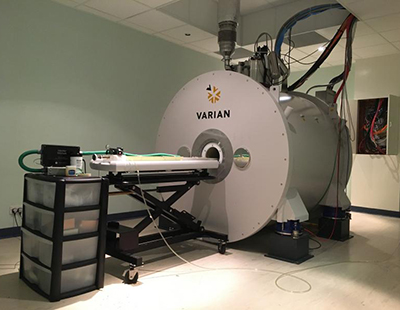Installation of new preclinical MRI scanner advances capabilities

The installation of a new 9.4T magnet for the preclinical MRI scanner for Edinburgh Preclinical Imaging will further enhance the huge amount of work and investment that has taken place over the last three years in advancing the preclinical MRI scanner capabilities on Edinburgh BioQuarter.
This equipment will bring new opportunities to support the vast breadth of imaging research.
The 14-year-old, ageing and unsupported Agilent scanner has been upgraded in two phases:
Firstly in summer 2018, the electronics were upgraded to the latest Bruker Biospec Neo console then, most recently, the old Agilent 7T magnet was replaced by a new Bruker 9.4T magnet.
Following months of planning, the Edinburgh Preclinical Imaging team were faced with delayed by COVID-19 challenges, however the team were finally able to embark on this extensive magnet replacement infrastructure project in October 2020 over a 5-week period.
This major investment in a new 9.4T Bruker Biospec AVANCE Neo MRI scanner, was made possible by grants totaling £2.1m from the:
- Simons Initiative for the Developing Brain (SIDB)
- Biotechnology & Biological Sciences Research Council (BBSRC)
- Wellcome Trust
- UK Dementia Research Institute (UK DRI)
This equipment will bring many enhancements and advances to the preclinical MRI capabilities within Edinburgh Preclinical Imaging.
The new scanner is equipped with high performance gradients, multinuclear capability and a range of head and body coils.
Brain coils will enhance high-resolution structural imaging (e.g. T1, T2, T2*, FLAIR) and wide-ranging specialist imaging techniques (diffusion tensor, perfusion, permeability and magnetisation transfer imaging, functional MRI, multinuclear spectroscopy, angiographic and flow quantification).
Additionally, the team now have access to advanced protocols and software developments for cardiac imaging, whole body imaging and the study of other live organs and disease models across many animal species through their lifespan, along with the ability to scan a large variety of ex vivo specimens.
The magnet field strength upgrade from 7T to 9.4T will also enable higher resolution imaging, better sensitivity, enhanced signal to noise, faster acquisition times and improved 1H-spectroscopy.
Furthermore, the applications, hardware and software support from Bruker, one of the world’s leading manufacturers of preclinical imaging systems, will continue to bring new opportunities to support the vast breadth of imaging research within the Centre for Cardiovascular Science (CVS) and across all other Centres within the College and the wider University, ensuring the long-term sustainability of the preclinical MRI facility into the future.
Already, the team are looking at options to accessorise the new MRI scanner further to meet the requirements for new multimodal imaging capabilities within the UK DRI.
A huge well done goes to all involved in this project over the last few years from inception through to completion.



